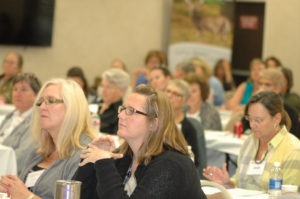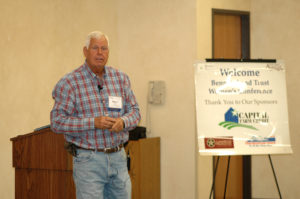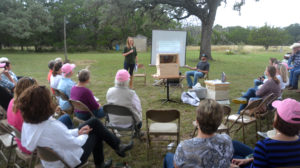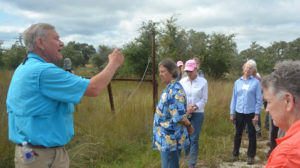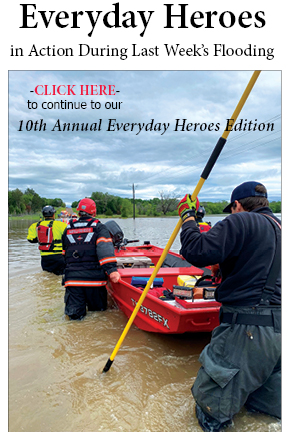Mentorship between generations, over fences important
FREDERICKSBURG – “Learn, support, educate” may not have been the theme but was the outcome of the second annual conference for women interested in conservation and stewardship of land in the Edwards Plateau, according to participants and presenters alike.
The Women in Wildlife Conservation conference recently held in Fredericksburg and attended by more than 70 women was an effort to help those who are inheriting land, purchasing land or who have become owners of land for various reasons, said Dr. Larry Redmon, Texas A&M AgriLife Extension Service program leader in College Station.
“We think this is an underserved audience,” Redmon said. “We think by getting these ladies together and discussing things with them about land stewardship, especially here in the Edwards Plateau, we can impact not only those who currently own the property, but those who will come after them, their daughters and the granddaughters.”
Megan Clayton, AgriLife Extension range specialist in Corpus Christi, spoke about “Stewardship in the Edwards Plateau – The Next Generation.”
Women representing land holdings of all sizes attended the second annual conference on stewardship in Fredericksburg. (Texas A&M AgriLife photo by Kay Ledbetter)
Clayton said the “next generation” is diverse, because it might be mothers similar to her own who in their 60s are just becoming the landowner. Or, it might be the daughters who barely have a connection with that land, who are being handed the responsibilities.
The current workforce is currently comprised of five working generations, something that has never happened before, she said.
She described them as the “Traditionalists,” born in 1945 and before, who worked longer than most, as long as they were physically able.
“Many times the grandparents work as long as they possibly can and are in charge,” Clayton said.
She said one or more of their children may work with them, but their wisdom doesn’t always get handed down to all of the children and grandchildren equally, even though all may have an equal share in the land management one day.
Billy Kniffen, retired Texas A&M AgriLife Extension Center water resource associate from Menard, discusses rainwater harvesting for wildlife. (Texas A&M AgriLife photo by Kay Ledbetter)
Then came the “Baby Boomers,” 1946-1964, who are not completely in the position to retire yet, she said. They have had to get work off-ranch sometimes because the older generation was still working the ranch.
“Generation Xers, 1965-1976, are just now peaking in their outside careers. A lot of them saw there wasn’t a place at the ranch for them at the time, so they sought a career outside, but have an interest in coming back and are thinking about returning,” Clayton said.
The Millennials, 1977-1995, are in the middle of their careers and starting their families and question how they fit into the multi-generational land heritage. And finally, Generation Z or iGen, born 1996 and after, might only see land recreationally, she said.
“They don’t see the land as a moneymaker for them. They like it, they enjoy it, but they don’t see a profit in it for them. They may even see it as a burden,” Clayton said.
She encouraged those in attendance to learn and support each other, “because you are each other’s resources, and in the future there will be more and more women who are landowners, and they are going to be looking to you for mentorship.”
The group identified some challenges women might face that men do not, including physical limitations; time, especially when they are still the caregivers of the household; overall knowledge, as it might not have been passed down to them over the years; and management authority.
The Women in Wildlife Conservation – Resources to Set a Stewardship Path conference included a session on beekeeping. (Texas A&M AgriLife photo by Kay Ledbetter)
Clayton said it is important that landowners let their children in on the decision making and responsibilities as early as possible so they have some working knowledge of what to do with the land when they become the manager.
“Maybe it’s just a pasture or two or the hunting lease management or some completely different enterprise, but do something that gives them a tie to that land and lets them be involved in it today so they will have an interest later when it is time for them to take over, so they won’t see it as a burden.”
Norma Favaro, who attended with her daughter, Constance Favaro, knows that feeling. She attended the women’s conference because she is inheriting a ranch from her aging mother.
“I came here to see what women do with their land – it felt like a burden to me, kind of scary, all the weight on my shoulders as someone who had never taken care of it,” Norma Favaro said. “My mom and dad had always taken care of it. Learning about stewardship is something new to me.”
Constance Favaro said she hopes what she learns can be used later when it is her time to take over, but also now to help her mother on things like leases, deer population management and help her not be so scared.
“Some of the topics we heard have got me excited now,” Norma Favaro said. “It’s given me that joy again, and it’s no longer something I have to do, but something I ‘get’ to do.”
Dr. Barron Rector, Texas A&M AgriLife Extension Service range specialist, College Station, provided the women with a walking weed identification tour. (Texas A&M AgriLife photo by Kay Ledbetter)
They said it’s been a great experience to meet others who have the same struggles and being able to bond with them and bounce ideas off them, and to recognize there are differences between men and women and the challenges they face.
Additionally, attendees heard about rainwater harvesting for wildlife purposes, developing hunting lease agreements, deer and wildlife habitat management, the Master Naturalist program, financing hunting enterprises, beekeeping, and took a tour of native rangeland, identifying beneficial plants for wildlife.
Joan Luedke of Centerville and her daughter, Stacy Luedke Hill of Mesquite, have a ranch with more than 200 acres. They attended to “try to learn how to maximize the property we have and how to minimize the problems we have,” Joan Luedke said.
“We’re also here to get new ideas on what we can do with our land, learn from the other ladies here in an environment where we feel comfortable raising our hands and asking questions and not having to be embarrassed that we don’t know the answers,” Stacy Luedke said.
She said they’ve learned about rainwater harvesting, improving habitat for all animals and bringing their land back to a native state instead of just a cow pasture with deer on it.
“A lot of what we have is an invasive habitat,” Joan Luedke said. “We need to find better ways to take care of that. It’s nice to know we are not out here alone.”
Redmon said last year’s theme was overall land stewardship, an introductory program to the Edwards Plateau country and its history, as well as invaders such as juniper and wild hogs.
“This year we had more of a slant to wildlife, as that is very important to landowners in the Hill Country,” he said. “One landowner told me the revenue they derive from the wildlife many times is the profit, sometimes the only profit, they have on the ranch.”
Redmon said each October they will hold the conference in Fredericksburg and while the theme of the conference may change, the overall the purpose will be land stewardship and how to take care of “your piece of Texas.”

